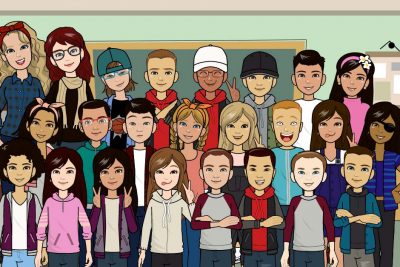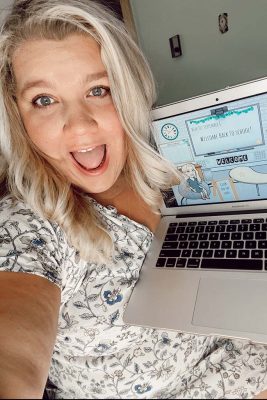
When Madison Corlett started teaching, the idea of giving back came full circle with her desire to share that focus with her students.
From a young age, Madison Corlett ’16 (ED), ’17 MA, was excited about helping others, raising money through lemonade stands and other fundraisers, then donating the money to local causes.
In elementary school, Corlett was hospitalized for a week with pneumonia. She saw other kids in the hospital who were much sicker than she was.
“I wasn’t as sick as some of the other kids who were fighting these horrible diseases,” she says. “I realized that these kids weren’t able to go to school.”
She recalled one of her mom’s early fundraisers for her best friend in grade school, who had a rare disease that required a bone marrow transplant.
“My mom had a hair-cut-a-thon that helped raised money for my friend’s treatments. I remember at the time that these treatments would cost almost a million dollars in the end,” she says. “That stuck with me, as she was out from school for a whole year.”
Her friend’s brother went through the same treatment a few years later. Luckily, both of them are now healthy and thriving. Her own hospitalization, her friend’s hospitalization, and the realization that other children had it much worse, stuck with her.
Today, as a fourth-grade teacher in Mansfield, Connecticut, she brings those life lessons to her classroom.
Corlett Gets Her Students to Be Passionate
When Corlett started teaching four years ago, the idea of giving back came full circle with her desire to share that focus with her students.
“We talk a lot about being a citizen of the world and doing more than just within yourself,” she says. “I think it’s important to give kids opportunities to give back and learn why that’s so important and how it feels good to give and to take care of people.”
“That’s something that I always try and think about and share with my students,” she adds.
Corlett came up with the idea of “passion projects” for her students one day when before school after she was inspired by one of her own students who had created an animal sanctuary drive.
“I think it’s important to give kids opportunities to give back and learn why that’s so important … to take care of people.”
— Madison Corlett ’16 (ED), ’17 MA
As Corlett and students in her class talked about what was going on due to the pandemic, she asked, “What are you passionate about helping?”
Ideas from the students included helping seniors, animals, and essential workers. To help seniors in the area, the students made greeting cards and delivered them to convalescent homes and senior centers.
“Senior citizens were alone during the holidays, and this small gesture meant a lot,” Corlett says.
They also collected items and goods for an animal sanctuary in nearby Ashford, Connecticut. Before the pandemic, a previous class of Corlett’s had made care packages for veterans and collected stuffed animals for a Children’s Hospital.
This winter, the students decided to help local businesses in Mansfield, Connecticut. These local businesses were familiar to them, and some of their families knew the owners or managers.
Corlett suggested they put together a presentation and set up a meeting with the Mansfield Public Schools’ superintendent, Neag School alumna Kelly Lyman ’88 MA, ’01 6th Year, ’10 ELP.
In a Hartford Courant article, Lyman remarked that she wasn’t surprised the Mansfield students came up with the idea.
“In our district, we focus on providing authentic experiences that build life skills, and help find opportunities for students to apply what they are learning,” said Lyman.
“In our district, we focus on providing … opportunities for students to apply what they are learning.”
— Kelly Lyman ’88 MA, ’01 6th Year, ’10 ELP
“Superintendent Lyman was great and was able to ask them all kinds of questions to push their thinking and get them to think a little outside of the box, and that’s where the idea of gift cards came from,” says Corlett. “The students then thought they could encourage Mansfield citizens to buy the gift cards.”
Lyman suggested the student group meet with the Mansfield Downtown Partnership, a local organization that supports Mansfield’s promotion and economic development. During the meeting, there was a discussion about what they would do with the gift cards. The students decided the gift cards should go back to local essential workers.
“Their cool idea came full circle, and we started a GoFundMe page to raise funds,” says Corlett. “We are close to reaching our goal, and the students and their families are continuing to get the word out.”

Managing Teaching Through the Pandemic
Like all educators this past year, Corlett learned how to deal with the pandemic and remote teaching and learning. Her class of fourth-graders is a group of 22 students from across three elementary schools whose parents selected remote-only learning for their child during the academic year.
Corlett acknowledges that it’s been “crazy,” but feels like her students are in a “really good groove now.”
“They’re able to access all of the academics almost exactly as they would in class,” she says.
She says she has enjoyed teaching in this space, as it allows her the opportunity to know families at a different level than before. “My class feels a strong sense of community because they’re the only fourth-graders that are remote.”
When they transition to middle school in fifth grade, they will know kids from different schools. “That’s a cool experience,” she says.
Pivoting to remote-only learning was a transition for her, and it was trial and error at first.
“I would give the kids a whole week of assignments at the beginning of the week, thinking that it would be helpful for them to see across the week,” she says. “That was not helpful at all. They like to get their assignments daily. That’s one thing I learned.”
She also learned that using too many platforms became overwhelming and stressful for the kids, and found a balance between synchronous and asynchronous instruction. “Keeping the classroom routines and community building activities, similar to regular learning, is key,” she says.
Like the passion projects, she says community-building activities have helped her and her students during this chaotic time. One of her favorite activities includes a daily “lunch bunch” where the students go into a breakout room with their friends to have lunch.
“Doing things you and your students love and are excited about, in addition to the regular curriculum, is so important.”
— Madison Corlett
“Doing these activities makes your heart full and, at the same time, they benefit the kids,” she says.
The passion projects have helped keep Corlett, and her students, stay engaged in school on a different level. “It’s been a bonus for them, and they have gained new communication and thinking skills.”
In reflecting on this past year, Corlett says that “doing things you and your students love and are excited about, in addition to the regular curriculum, is so important.”
“Teachers forget they were people — and kids are people,” she adds, “and doing things a little outside the box makes learning meaningful, fun, and fresh.”
 Facebook
Facebook
 Twitter
Twitter
 LinkedIn
LinkedIn
